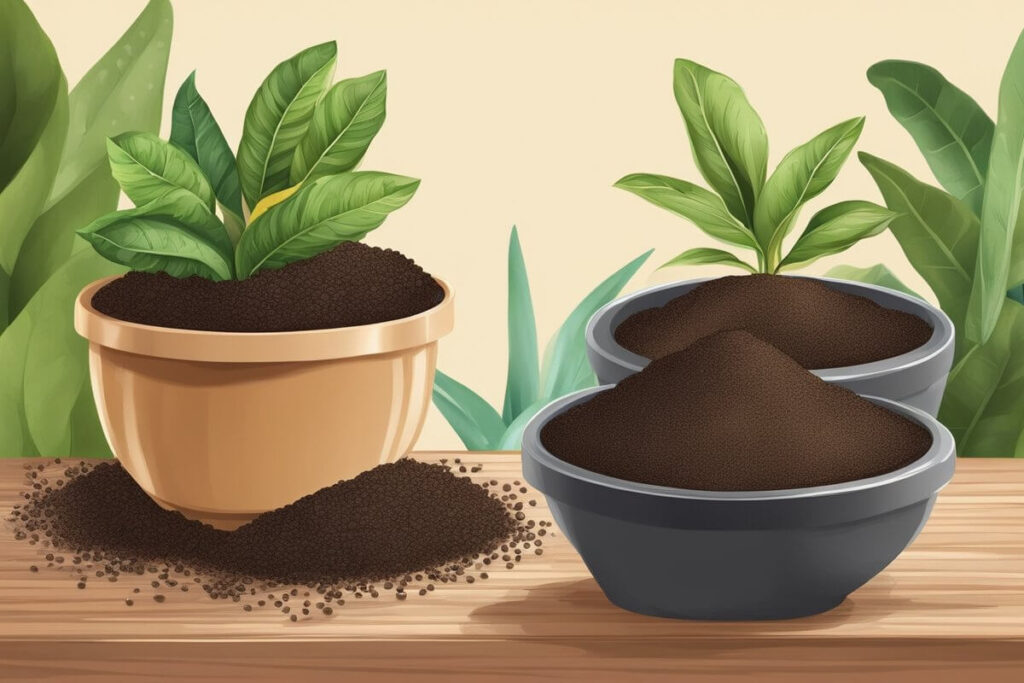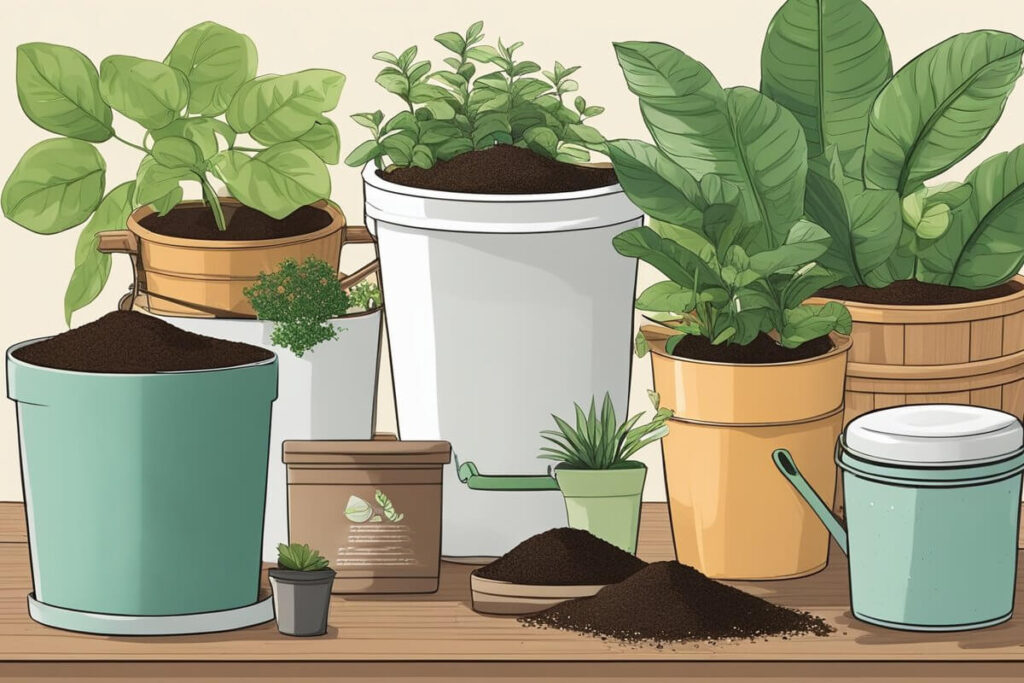Creative Eco-Friendly Ways to Reuse Coffee Grounds
Coffee grounds are more than just a part of your morning routine; they’re a versatile resource waiting to be tapped into. Every day, massive amounts of used coffee grounds are tossed out without a second thought, contributing to our ever-growing waste problem. Though they are biodegradable, there are many things that you can do with coffee grounds that are more valuable than letting them decompose in a landfill.
Embracing an eco-friendly approach, you can turn what would be waste into something wonderful and useful, reducing your environmental impact and giving your coffee grounds purpose beyond the brew.

Incorporating used coffee grounds into your daily life is simpler than you might think and can be done in numerous creative ways. From enriching your garden to crafting homemade skincare, the possibilities are truly endless. The pleasing scent of coffee doesn’t have to end in your cup. By reusing coffee grounds, you can infuse them into various aspects of your home and lifestyle, integrating sustainable practices that benefit the earth and add a touch of creativity to your routine.
Key Takeaways
- Used coffee grounds can be repurposed in many household and garden applications.
- Reusing coffee grounds contributes to a sustainable and waste-reducing lifestyle.
- Integrating coffee grounds into everyday use is a simple yet impactful eco-friendly act.
Creative Reusability of Coffee Grounds at Home
Believe it or not, your morning coffee offers more than just a caffeine boost. The leftover grounds can be repurposed into effective cleaning agents, natural deodorizers, and even self-care products, right in your own home.
Cleaning Powerhouse
- Kitchen Sink Scrub: Mix coffee grounds with a bit of dish soap to create an abrasive scrub for your kitchen sink. It’s an easy way to buff away stains without harsh chemicals.
- Stubborn Surface Cleaner: The coarse texture of coffee grounds makes them perfect for scrubbing down your wooden furniture. They’ll help remove scuff marks without damaging the surface.
Natural Deodorizing Solutions
- Fridge Freshener: Place a bowl of dry coffee grounds in your fridge to neutralize odors. They act like a natural air freshener, absorbing any unwelcome smells.
- Trash Can Deodorizer: Sprinkle a handful of grounds at the bottom of your trash can to keep stinky garbage smells at bay. It’s a quick fix for a fresher kitchen.
Self-Care Remedies
- Homemade Exfoliant: Combine coffee grounds with coconut oil for a natural exfoliant. Gently massage it onto your skin to slough off dead cells and reveal a radiant complexion thanks to coffee’s natural antioxidants.
- DIY Antioxidant Face Mask: Mix grounds with a bit of honey for an antioxidant-rich face mask. It’ll leave your skin feeling refreshed and invigorated.
Enhancing Gardens with Coffee Grounds
Coffee grounds can be a game changer for your garden, offering benefits from compost enrichment to natural fertilizing. They’re not just for brewing; let’s put them to work for greener, happier plants.

Composting with Coffee Grounds
Coffee grounds contribute to the composting process by adding nitrogen, an essential element that helps microorganisms thrive. Simply sprinkle the grounds into your compost bin to enrich the soil with nutrients that support plant growth. Here’s how to mix them in:
- Add coffee grounds to your compost pile as a “green” compost material.
- Balance them with “brown” compost materials like dry leaves or newspaper.
- Aim for a ratio of 1 part coffee grounds to 3 parts brown material.
Natural Fertilizing Techniques
Coffee grounds are a natural fertilizer, introducing nutrients like nitrogen, potassium, and phosphorus into the soil. These nutrients are vital for plant growth. Use the grounds by:
- Mixing them into the soil around your plants.
- Allowing the grounds to dry and then scattering them lightly as a top-dressing.
- Be cautious not to overdo it—too much can lead to soil compaction.
Eco-Friendly Pest Management
Keep those unwanted garden pests away with coffee grounds. The abrasive texture and strong scent are natural deterrents for slugs and snails. Protect your garden by:
- Spreading a barrier of grounds around susceptible plants.
- Refresh this barrier after heavy rain, as it can easily wash away.
These are great to use in combination with egg shells to fertilize and deter pests at the same time! Remember, while coffee grounds can help your garden thrive, it’s all about balance. Use them in moderation and watch your garden come to life.
Culinary Adventures with Used Coffee Grounds
Repurposing used coffee grounds not only benefits the environment by reducing waste but can also introduce a unique and rich flavor to your cooking. Let’s dig into how you can infuse new life into those spent grounds from your morning brew.
Flavor-Enhanced Cooking
You can kick your spice rubs and marinades up a notch with the addition of used coffee grounds. The grounds add a nuanced, smoky flavor and are especially great for red meats. Combine them with ingredients like brown sugar, paprika, and a dash of salt to create a rub that both tenderizes and imparts a deep, earthy taste. Used coffee grounds also contain caffeine, although in much smaller amounts post-brew, which can offer a subtle pick-me-up to your dishes.
Homemade Goodness
In the realm of desserts and baked goods, coffee grounds can become a secret ingredient that rewards with complexity and an antioxidant boost. You can infuse custards and homemade ice creams with the grounds for a coffee-flavored treat. Or, for a more rustic touch, mix the grounds into homemade chocolate cakes or brownies to give them a rich, mocha spin. Remember, a little goes a long way, so start with just a sprinkle and adjust to your taste.
Eco-Conscious Crafting
When you look at your leftover coffee grounds, see them as more than just waste; they’re a resource ripe for eco-friendly crafting. Let’s dive into how your coffee grounds can nurture plants or pamper your skin.
Natural Dye
You can use coffee grounds to dye fabric, paper, and even Easter eggs to a warm brown tone. It’s simple:
- Boil used coffee grounds for a strong dye bath.
- Soak your material in the dye for different lengths of time for varied shades.
Tip: Reuse old t-shirts to create naturally dyed, eco-friendly crafts.
Remember, these are just a starting point. Your eco-conscious crafting journey with coffee grounds is limited only by your imagination and willingness to experiment. Happy crafting and beautifying!
Frequently Asked Questions
How can I use coffee grounds in the garden as a natural fertilizer for my plants?
Coffee grounds can be a garden’s friend, especially for acid-loving plants like azaleas and blueberries. Coffee grounds are rich in nitrogen, which is crucial for plant growth. When used as compost, made into a tea for watering, or sprinkled directly in the soil, they can enhance fertility and help retain moisture.
Can you share some tips for integrating coffee grounds into a skincare routine?
Sure, coffee grounds work as a natural exfoliant. You can mix them with a bit of coconut oil or honey to create a homemade face scrub that’s not only gentle but also rich in antioxidants.
How long can I store coffee grounds, and what’s the best way to do it?
You can store used coffee grounds for quite a while as long as they keep dry. Dry them out fully before storing them to prevent mold. Keep them in an airtight container away from direct sunlight to maintain their benefits.
How can I properly dispose of coffee grounds in an eco-conscious manner?
The best way to dispose of coffee grounds is by composting, which returns valuable nutrients to the soil and reduces landfill waste. Otherwise, consider adding them to your garden directly or sharing with gardening friends.
X
Citations for This Article
APA
Plonkey, Jim. (February 19, 2024). Creative Eco-Friendly Ways to Reuse Coffee Grounds. Natural Replacements. Retrieved March 2, 2026, from https://naturalreplacements.com/learn/food/reuse-coffee-grounds/
MLA
Plonkey, Jim. "Creative Eco-Friendly Ways to Reuse Coffee Grounds." Natural Replacements, https://naturalreplacements.com/learn/food/reuse-coffee-grounds/
Chicago
Plonkey, Jim. "Creative Eco-Friendly Ways to Reuse Coffee Grounds." Natural Replacements, Last modified February 19, 2024. https://naturalreplacements.com/learn/food/reuse-coffee-grounds/
